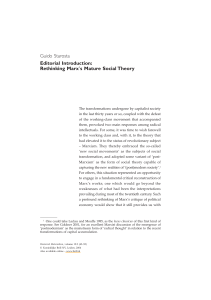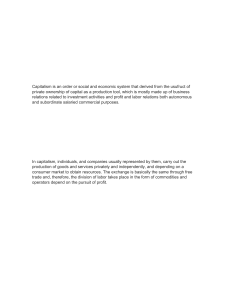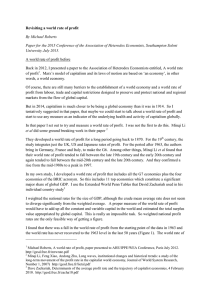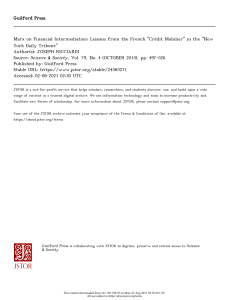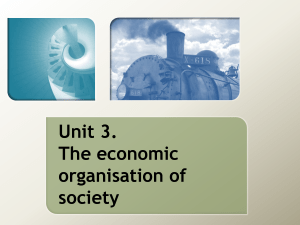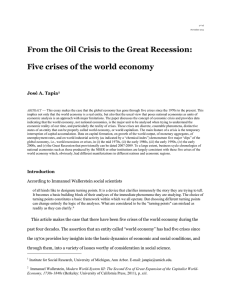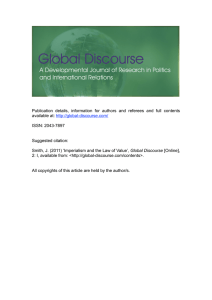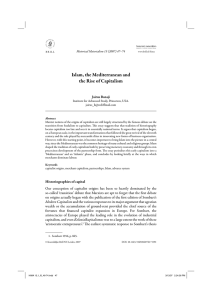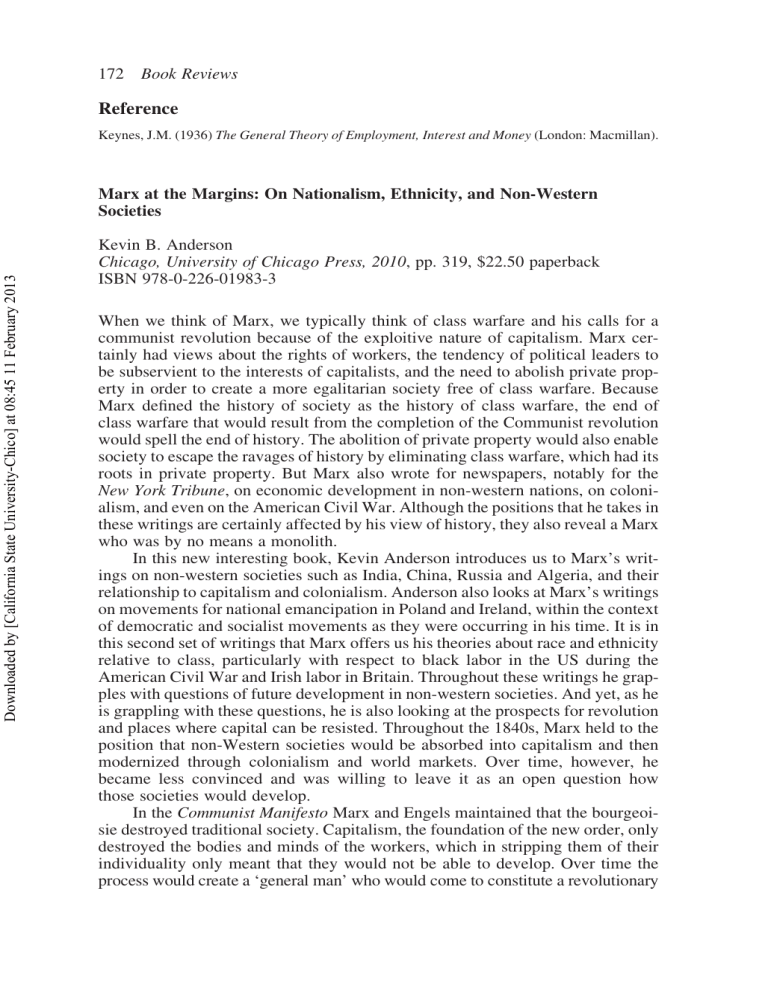
172 Book Reviews Reference Keynes, J.M. (1936) The General Theory of Employment, Interest and Money (London: Macmillan). Downloaded by [California State University-Chico] at 08:45 11 February 2013 Marx at the Margins: On Nationalism, Ethnicity, and Non-Western Societies Kevin B. Anderson Chicago, University of Chicago Press, 2010, pp. 319, $22.50 paperback ISBN 978-0-226-01983-3 When we think of Marx, we typically think of class warfare and his calls for a communist revolution because of the exploitive nature of capitalism. Marx certainly had views about the rights of workers, the tendency of political leaders to be subservient to the interests of capitalists, and the need to abolish private property in order to create a more egalitarian society free of class warfare. Because Marx defined the history of society as the history of class warfare, the end of class warfare that would result from the completion of the Communist revolution would spell the end of history. The abolition of private property would also enable society to escape the ravages of history by eliminating class warfare, which had its roots in private property. But Marx also wrote for newspapers, notably for the New York Tribune, on economic development in non-western nations, on colonialism, and even on the American Civil War. Although the positions that he takes in these writings are certainly affected by his view of history, they also reveal a Marx who was by no means a monolith. In this new interesting book, Kevin Anderson introduces us to Marx’s writings on non-western societies such as India, China, Russia and Algeria, and their relationship to capitalism and colonialism. Anderson also looks at Marx’s writings on movements for national emancipation in Poland and Ireland, within the context of democratic and socialist movements as they were occurring in his time. It is in this second set of writings that Marx offers us his theories about race and ethnicity relative to class, particularly with respect to black labor in the US during the American Civil War and Irish labor in Britain. Throughout these writings he grapples with questions of future development in non-western societies. And yet, as he is grappling with these questions, he is also looking at the prospects for revolution and places where capital can be resisted. Throughout the 1840s, Marx held to the position that non-Western societies would be absorbed into capitalism and then modernized through colonialism and world markets. Over time, however, he became less convinced and was willing to leave it as an open question how those societies would develop. In the Communist Manifesto Marx and Engels maintained that the bourgeoisie destroyed traditional society. Capitalism, the foundation of the new order, only destroyed the bodies and minds of the workers, which in stripping them of their individuality only meant that they would not be able to develop. Over time the process would create a ‘general man’ who would come to constitute a revolutionary Downloaded by [California State University-Chico] at 08:45 11 February 2013 Book Reviews 173 subject. In an 1853 article on India, for instance, Marx predicted that British capitalism would face the twin challenges of the rise of the British working class and the rise of the Indian national liberation movement. In approaching the developing world, especially in Asia, Marx emphasizes in a series of articles that both capitalism and colonialism were bringing progress to Asia, which would go through a similar development to that which had already occurred in Europe as well as a democratic revolution. But in China, progress would come not only from outside intervention, but also from indigenous forces, mainly the Taiping Rebellion. Marx’s vision of workers rising up against their capitalist exploiters only serves as a model for democratic and national movements. Ethnic and racial minorities are also viewed through the prism of the working class. Marx’s anti-colonialist position doesn’t really begin to emerge until his articles on the great Indian revolt of 1857258, which broke out during the Second Opium War against China. Although Russia is where the Communist Revolution first occurred, Marx never really considered it among the developed nations. As much as he sympathized with the Russian people, he portrayed them and their country in one-dimensional and condescending terms in his writings of the mid-1850s. Yet his attitude towards Russia began to change in 1858, evidently because the new tsar Alexander II was considering emancipation of the serfs, and because Russian society was suffering from tremendous human and financial losses resulting from the Crimean War. Still, Marx wasn’t convinced Russia could generate a revolution from its internal conditions alone; rather, it would need a push from the revolutionary movement in the West. Oddly enough, the struggle of the Polish people to restore their national independence would serve as a model. Marx’s writings on the American Civil War and Ireland are perhaps the most interesting ones covered by Anderson. Marx saw the American Civil War as one of the century’s major battles for human emancipation, and one that would force white labor in the US and Britain to take a stand against slavery. In the 1867 preface to Capital, he wrote that the Civil War was the harbinger of socialist revolutions to come. In a piece that appeared in the New York Tribune in 1861, Marx argued that the working people of Europe supported the Union not only because they were anti-slavery but because they considered the US to be the most democratic society of the time. For Marx, the Union’s cause was the same as the international struggle for democracy and revolution. Marx’s writings on Ireland, especially those from around 1870, are the culmination of the interweaving of class, race and ethnicity that is also found in his writings on Poland and the American Civil War. He viewed Ireland as the locus of progressive nationalism, hence as an important source of opposition to Britain and to global capital. Irish workers, Marx wrote, formed the sub-proletariat within Britain, thereby offering an interplay of class and ethnicity. In a letter of April 1870 to a couple of German-American members of the International in New York, Marx describes Ireland not only as a stronghold of the English Aristocracy, but as a society ripe for revolution. Then, during the 1860s, Marx began to connect Ireland to the question of communal property. As much as Britain was a modern industrial country, it still had a large landowning class, with much of their holdings in Ireland. This created a dialectic: on the one hand, the dominant classes strengthened against the English working classes, Downloaded by [California State University-Chico] at 08:45 11 February 2013 174 Book Reviews but on the other hand the dominant classes were also vulnerable from within Ireland itself. And so during the winter and spring of 1869270, Marx’s writings on Ireland represented a concretization of the dialectics of class and national liberation in the struggle to uproot capitalism at a specific juncture in the history of both Europe and America. Anderson notes that Marx never made national selfdetermination into an abstract principle separate from the issue of whether a given movement had a liberating content. Nevertheless, his continually evolving stand toward non-Western societies did inform his overall argument in Capital. The picture that emerges from Anderson’s account is a much broader critique of capital than commonly assumed. Marx maintained, for instance, that the end of colonialism in India would sooner or later come about either through the aid of the British working class or by the formation of an Indian independence movement. Although the North during the American Civil War was a capitalist society, Marx nevertheless supported the anti-slavery cause. His Civil War writings typically connected race with class. White racism held back labor as a whole. He considered the subjectivity of the enslaved black laboring class as a decisive force in the war’s favorable outcome for the North. He also noted British labor’s unstinting support for the North. Similarly, he supported the Polish uprisings of 1863, and he viewed the Russian aristocracy as a form of ‘Oriental despotism’ inherited from Mongol conquests. The important factor that may have given Marx cause for hope was that working class support for the Northern cause in the Civil War and then the 1863 uprising in Poland brought an international network of labor activists into being. He saw no real difference between the attitudes of British workers and poor whites in the American South. Although Marx’s theorizing on nationalism, ethnicity and class was most fully realized in his writings on Ireland, his most advanced reflections on non-Western societies are to be found in his writings on Russia between 1877282. Ultimately, what this book demonstrates, and demonstrates well, is the impressive sophistication of Marx’s analysis of how the power of capital dominated the globe and created a worldwide system of industry and trade with its attendant universal class of the oppressed, i.e., the industrial working class. Yet, as Anderson points out, Marx also strove to avoid formalistic and abstract universals. Nevertheless at the level of what Anderson refers to as the ‘intersectionality of class with race, ethnicity, and nationalism,’ many of Marx’s theoretical conclusions may have more relevance to us today. Specifically, Marx’s writings on the relationship of race and class during the Civil War era, on the relationship of the struggle for Polish independence to the wider European revolution, and on the relationship of the Irish independence movement to British labor, continue to be relevant today because they ‘can help us to critique the toxic mix of racism and prisonization in the United States, or to analyze the Los Angeles uprising of 1992, or to understand the 2005 rebellion of immigrant youth in the Paris suburbs’ (p. 245). But is this really true? This assumes that the Marxist prism is the only way to view these events. Implicit in this statement is the notion that in the absence of the Marxist critique, we simply would not understand these events at all. And yet the reader is left hanging as to just how Marx’s writings do apply to these contemporary events. Marxism has become one of several different paradigms through which to read various conflicts in contemporary global politics. Mass movements to topple Downloaded by [California State University-Chico] at 08:45 11 February 2013 Book Reviews 175 autocratic governments in the Middle East and labor union protests in the US against Republican-controlled state governments seeking budget cuts can always at some level be interpreted as contemporary reactions against capitalist exploitation of labor. But that is not the only way, and it may not be the most accurate way, to interpret such events. World events are also influenced by religious and cultural variables and cannot always be reduced to capitalist—and by extension colonialist—exploitation of labor. Not everything is reducible to economics and to cleavages between the haves and the have-nots. In other words, there are other paradigms, and the Marxist paradigm should not be taken as necessarily the correct one. Anderson, however, does not allow for the possibility that there may be other equally valid prisms through which to view the world. Herein would appear to lie the greatest irony, as his purpose was to demonstrate how broad Marx was, yet he succeeds only in demonstrating how narrow his approach is. Yet there is much to learn from this book about how Marx viewed different events around the world and how they shaped his revolutionary politics. As an intellectual project, this book represents a fine addition to the literature. Oren M. Levin-Waldman Metropolitan College of New York Email: [email protected] # 2013 Oren M. Levin-Waldman The Elgar Companion to Hyman Minsky Dimitri B. Papadimitriou & L. Randall Wray Cheltenham, Edward Elgar 2010, 304 pp., £110.00 hardcover ISBN 978-1-84720-849-1 The publication of the Elgar Companion to Hyman Minsky is a timely issue, as Europe and North America grapple with apparently intractable debt problems, and the better-read commentators vie with each other to quote Minskyan insights. Those insights abound, but not in the most transparent way in his work. Minsky thought in a complex way about a complex world, in contrast to most economists, who spend their time trying to reduce our complex world to simple models. The clear expression of complex ideas is perhaps the most underestimated and most difficult aspects of the practice of economics. Generalisations too easily give rise to ambiguity of interpretation and to misunderstanding. All serious economists, from Adam Smith, through Marx to Schumpeter and Keynes, have in this way made themselves vulnerable to misinterpretation. Added to this is the untidiness of how complex ideas evolve: Minsky put forward at least three different versions of his famous Financial Instability Hypothesis. This multiplies the scope for misinterpretation, even without the obscurities and inconsistencies (for example between net and gross debt) in Minsky’s own work. There is therefore an urgent need for a handbook that would explain the essential concepts that Minsky used: the different financing structures
